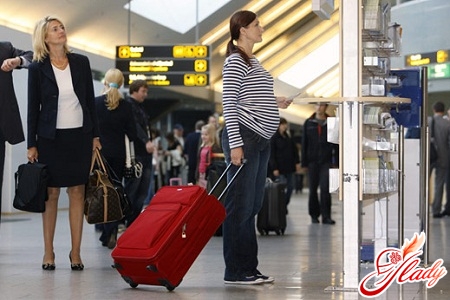 Warm summer days are coming soon, andзначит, и время отпусков. В последние годы все больше семей на время отпуска покидают пределы родной страны. И будущие родители, с нетерпением ожидающие появления на свет наследника или наследницы, тоже не стали исключением из правил. И в этом нет ничего удивительного, ведь очень скоро жизнь семьи станет весьма бурной и насыщенной. Так почему бы не посвятить оставшиеся месяцы спокойствия и тишины отдыху? Очень часто транспортом к месту отпуска становится именно самолет. Казалось бы, полет давно стал частью жизни современного человека. Но в случае с беременной женщиной не все так просто – сразу же возникает вопрос, можно ли ей летать? Совместимы ли беременность и самолёт? Или все же летать не стоит? Медики утверждают, что совместимы, однако риск перелёта должен быть тщательно продуман и сведён к минимуму. В правилах некоторых авиакомпаний запрещено появляться на борту самолётов женщинам в любой стадии беременности, но это, скорее, исключение из правил. В целом же, беременность и перелёт на самолёте – достаточно обыденное явление, которое сопровождается выполнением некоторых условий и соблюдением тех или иных мер предосторожности, чтобы полет прошел успешно. Это вполне приемлемый вариант путешествий, не требующий каких-либо медицинских справок. При более поздних сроках перед полётом беременной женщине следует время получить медицинскую справку, в которой указывается приблизительный срок родов и даётся разрешение на полёт. При очень поздних сроках беременность и самолёты – очень опасное сочетание, поэтому от перелётов на время лучше всего отказаться совсем. Но если вы все же решите лететь, обязательно узнайте все подробности и нюансы. Каждая полет авиакомпания устанавливает свои правила допуска на борт беременных женщин. Будущим мамам необходимо знать эти правила, в противном случае их просто попросят покинуть салон самолёта уже непосредственно перед полётом. А это — потерянное время и нервы. И этого вполне можно избежать. На сегодняшний день самыми мягкими правилами, определяющими перевозку беременных женщинами, являются правила Аэрофлота. С точки зрения этой авиакомпании любая беременность совместимы, а на случай внезапно начавшихся во время перелёта родов все полет бортпроводницы Аэрофлота обучаются навыкам акушерства. Так что если полет ознаменуется началом родов, бортпроводники время тянуть не станут и при необходимости примут малыша. Хотя, конечно же, этим можно утешаться, но не стоит надеяться. Что касается специалистов, то они уверены, что беременность и перелёт на самолёте исключают друг друга, так как при любом сроке беременности перегрузки могут спровоцировать либо выкидыш, либо появление аномалий в развитии плода. Проще говоря, перелет представляет определенную опасность. Поэтому женщина, готовящаяся стать матерью, перед тем, как приобретать билет на самолёт, должна посоветоваться со своим врачом. Конечно же, можно махнуть рукой. Но зачем? Не стоит игнорировать этот визит — время, потраченное на поход к врачу, может спасти жизнь малышу. Если осложнений в беременности не наблюдается, а роды предстоят не скоро, доктора обычно разрешают полёт. И расскажут, чего можно ожидать, планируя полеты.
Warm summer days are coming soon, andзначит, и время отпусков. В последние годы все больше семей на время отпуска покидают пределы родной страны. И будущие родители, с нетерпением ожидающие появления на свет наследника или наследницы, тоже не стали исключением из правил. И в этом нет ничего удивительного, ведь очень скоро жизнь семьи станет весьма бурной и насыщенной. Так почему бы не посвятить оставшиеся месяцы спокойствия и тишины отдыху? Очень часто транспортом к месту отпуска становится именно самолет. Казалось бы, полет давно стал частью жизни современного человека. Но в случае с беременной женщиной не все так просто – сразу же возникает вопрос, можно ли ей летать? Совместимы ли беременность и самолёт? Или все же летать не стоит? Медики утверждают, что совместимы, однако риск перелёта должен быть тщательно продуман и сведён к минимуму. В правилах некоторых авиакомпаний запрещено появляться на борту самолётов женщинам в любой стадии беременности, но это, скорее, исключение из правил. В целом же, беременность и перелёт на самолёте – достаточно обыденное явление, которое сопровождается выполнением некоторых условий и соблюдением тех или иных мер предосторожности, чтобы полет прошел успешно. Это вполне приемлемый вариант путешествий, не требующий каких-либо медицинских справок. При более поздних сроках перед полётом беременной женщине следует время получить медицинскую справку, в которой указывается приблизительный срок родов и даётся разрешение на полёт. При очень поздних сроках беременность и самолёты – очень опасное сочетание, поэтому от перелётов на время лучше всего отказаться совсем. Но если вы все же решите лететь, обязательно узнайте все подробности и нюансы. Каждая полет авиакомпания устанавливает свои правила допуска на борт беременных женщин. Будущим мамам необходимо знать эти правила, в противном случае их просто попросят покинуть салон самолёта уже непосредственно перед полётом. А это — потерянное время и нервы. И этого вполне можно избежать. На сегодняшний день самыми мягкими правилами, определяющими перевозку беременных женщинами, являются правила Аэрофлота. С точки зрения этой авиакомпании любая беременность совместимы, а на случай внезапно начавшихся во время перелёта родов все полет бортпроводницы Аэрофлота обучаются навыкам акушерства. Так что если полет ознаменуется началом родов, бортпроводники время тянуть не станут и при необходимости примут малыша. Хотя, конечно же, этим можно утешаться, но не стоит надеяться. Что касается специалистов, то они уверены, что беременность и перелёт на самолёте исключают друг друга, так как при любом сроке беременности перегрузки могут спровоцировать либо выкидыш, либо появление аномалий в развитии плода. Проще говоря, перелет представляет определенную опасность. Поэтому женщина, готовящаяся стать матерью, перед тем, как приобретать билет на самолёт, должна посоветоваться со своим врачом. Конечно же, можно махнуть рукой. Но зачем? Не стоит игнорировать этот визит — время, потраченное на поход к врачу, может спасти жизнь малышу. Если осложнений в беременности не наблюдается, а роды предстоят не скоро, доктора обычно разрешают полёт. И расскажут, чего можно ожидать, планируя полеты. 
What do doctors say about pregnancy and airplane?
If you are expecting a clear answer, then, alas, there is none.No: every pregnancy follows an individual scenario, and the opinions of other mothers (someone will tell you that she was wildly traveling around the world during her entire pregnancy and then gave birth to a healthy baby, while someone else will tell you that an hour-long flight caused tragic consequences) will not help you decide. Everything depends on your doctor's recommendations, the timing of your pregnancy, and your relationship with airplanes in general. However, think very carefully about whether you need to fly if:
- The gestation period is less than 12 weeks, or more than 27
Doctors explain this recommendation by the fact thatIt is in the early stages that spontaneous miscarriages most often occur. And there is no need to increase this risk once again by planning a flight. And early toxicosis of pregnancy should not be overlooked - it is unlikely to be a pleasant addition to an already tiring flight. Well, in the third trimester of pregnancy, the female body begins to seriously prepare for childbirth. And as a result, a pregnant woman becomes more tired, there is a tendency to edema. And by this time the tummy grows not small - the expectant mother begins to move more and more. In addition, the flight provokes a strong narrowing of blood vessels, due to the constant pressure drop. And this can cause hypoxia. Or, more simply, fetal hypoxia. And the very prospect of giving birth to a baby on board an airplane or in a completely foreign country is not the most pleasant. Unless, of course, you are a fan of adventures and thrills. And the flight is not another game of roulette. So, although flying is not a direct threat to the normal course of pregnancy, it is still worth taking precautions.
- Threat of abortion
If the doctor is a gynecologistdiagnosed the expectant mother with a threat of miscarriage, pathological structure of the placenta and other complications, there can be no talk of any flight. And no flight is worth the risk of losing the most valuable thing you have - your baby.
- Aerofobia
In case you are afraid of flying, andthe word flight makes you immediately frantically cling to your husband's hand or the arm of the chair, you should refuse to fly. Probably, there is no need to explain why, right? Fear during a flight is a strong stress for the body of the expectant mother. And, as we know, pregnant women should not be nervous. If you absolutely cannot refuse to fly, contact your attending physician - gynecologist in advance. He will select for you a soft and gentle sedative that will relieve your fear a little and make the flight easier. In no case should you use any sedatives on your own, because there is a risk of harming the baby.
Precautionary measures
The plane and pregnancy involvetaking certain precautions so that a simple flight does not turn into unpleasant surprises. Due to sudden pressure changes and emotional stress, premature labor may begin, so it would be advisable to take mild sedatives before the flight. It is better to buy tickets for business class or the first row of economy class: there is more air and space here, the seats are quite wide and the passage to the front of the aircraft cabin is freer, which means the flight will be more comfortable. But tickets for the last rows should be avoided. By the way! You should not board immediately after check-in. Experienced mothers - travelers advise leaving the accumulator at the last minutes. The plane will not fly away without you in any case, and you will be able to have a certain freedom of movement for as long as possible. Believe me - you will still sit enough during the flight. Do not forget that the duration of the flight for a pregnant woman should not be more than 4 hours. Therefore, try not to plan trips to distant countries - this can become a very serious physical and emotional burden. If the trip cannot be cancelled, try to follow the recommendations below.
- Take care of veins!
During a flight, a person spends almost all of his timein a sitting position. And such a position significantly disrupts the normal blood supply to the legs. As a result, the blood stagnates and the legs swell. Moreover, the risk of aggravation of thrombophlebitis and varicose veins increases many times over. But expectant mothers are already at risk. Before the flight, doctors recommend wearing compression tights, which will help reduce this negative impact. In addition, it is necessary to get up and walk around the cabin at least once an hour to prevent your legs from falling asleep. And when you sit, periodically do simple exercises - rotate your feet, wiggle your toes, bend your knees.
- Liquid
The air in the airplane cabin is very dry, sothe body loses fluid very quickly. And for the body of the expectant mother, this is very, very undesirable. This can be prevented by drinking a glass of liquid every half hour.
- clothing
For the flight, you should wear loose clothing witha minimum of complicated details – remember the size of airplane toilets and imagine how you and your belly will have to turn around there. It is better to wear shoes without laces, so that you do not have to dig under the seat, taking them off if you are tired. And take long warm socks – your feet will be more comfortable in them, and the cold will not be scary. These simple measures can make your life much easier.
- Ask for help
Don't be shy about asking a flight attendant for help, asking her for the amount of water you need or a blanket. Flight attendants are there to help passengers fly comfortably.
- Take care of small things
You can take a small pillow from home,to put it under your lower back or neck. And stock up on food "for a snack". You never know, maybe the airplane food won't seem appetizing to you. Don't forget to fasten your seat belt, preferably for the entire flight (hitting your head when you get into an air pocket is not the best prospect, the flight should be safe). You need to fasten the belt under your stomach. We recommend reading:









